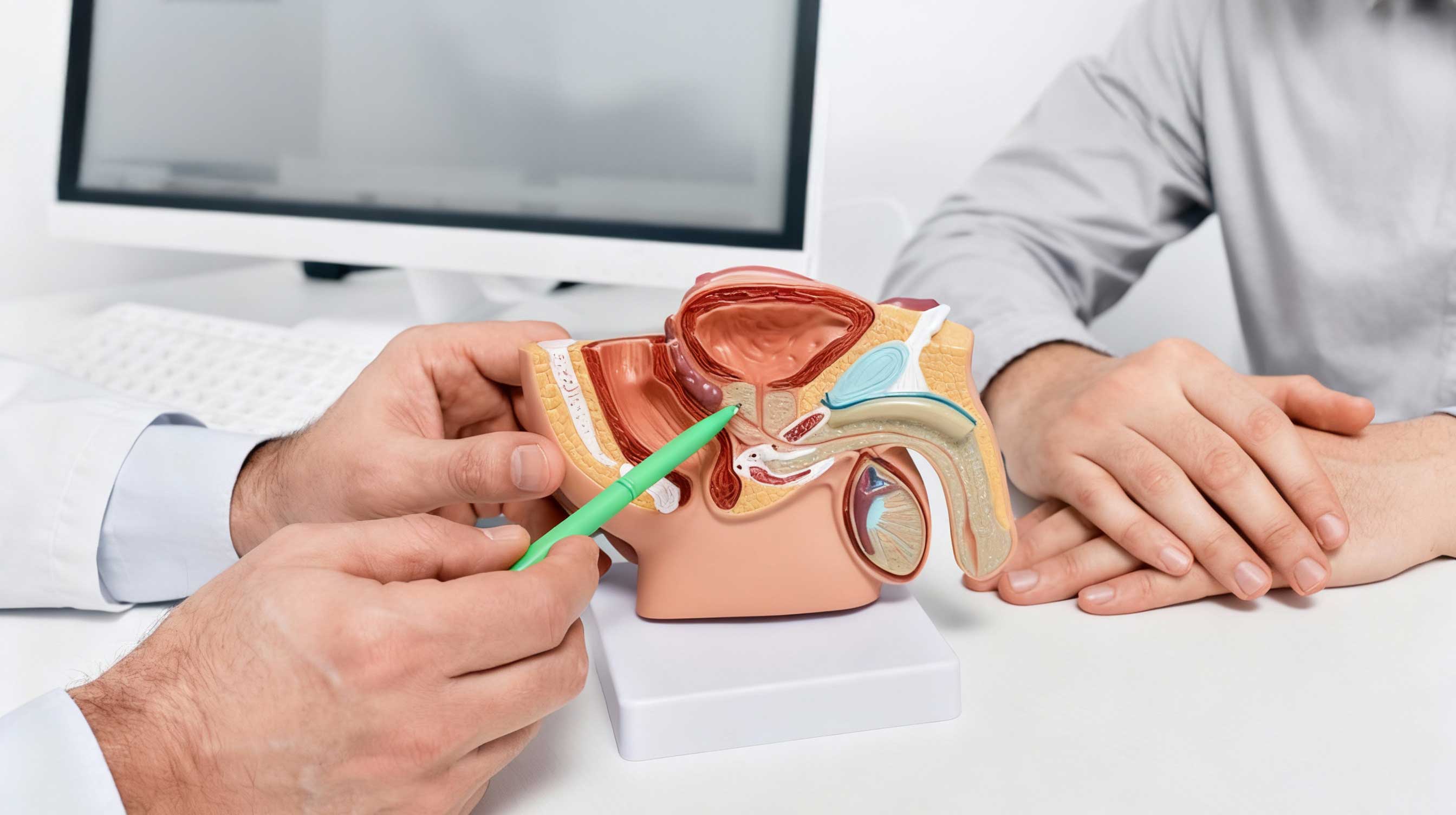What happens during an erection
Erections depend on healthy arteries, veins, nerves, smooth muscle, and hormones. When any part is out of balance, vascular, hormonal, or neurological causes can lead to problems.
Nervous system
Signals from the brain relax penile muscles and open arteries. Calm helps erections; stress releases adrenaline that tightens vessels and reduces blood flow.
Penis vasculature
Arteries bring blood in and expanding tissue compresses veins to keep it there. With venous leakage or artery disease, blood escapes and rigidity is lost.
Hormones
Balanced hormones, especially testosterone, support desire, energy, and erection quality. Very low levels or thyroid issues can contribute and may need treatment.
Nocturnal erections
Night and morning erections are normal maintenance from the autonomic system. Fewer or weaker episodes can point to a medical cause worth checking.
Find the cause, choose the right treatment
ED may result from vascular disease, diabetes, high blood pressure, stress, or hormonal changes. Often, physical and psychological factors combine.
Venous-related ED
When veins do not hold blood, erections fade or feel unstable. Good ultrasound confirms this, and targeted treatments can provide lasting improvement.
Arterial-related ED
Narrowed arteries from smoking, diabetes, or high blood pressure limit flow. Minimally invasive procedures and risk control help restore circulation.
Microvascular dysfunction
Very small vessels may underperform with inflammation, stress, or metabolic issues. Lifestyle changes and tailored medicine often improve firmness and stamina.
Hormonal imbalance
Low testosterone or thyroid problems rarely explain everything but lower desire and energy. Checking and correcting hormones supports erections and wellbeing.
Neurological conditions
Nerve signals can be disrupted by diabetes, surgery, or spine and brain disease. A focused neurological review clarifies the issue and points to practical support.
Psychological and stress-related ED
Performance anxiety, relationship strain, or chronic stress can interrupt erections. Coaching and sex therapy work well, often alongside physical treatments.
Free guide ‘Reconnecting Men to Life’
A practical overview of causes, diagnosis, and treatment choices, plus what to expect at consultation. Evidence based and easy to read. By Prof. Allaire.
What patients say about their journey
“It took three years to find the right place. Dr. Allaire’s team quickly diagnosed clogged arteries. I quit smoking, and Dr. Allaire placed a stent. Before, it took hours to get an erection. Now it happens right away.”
“We wanted to have children. No way, because no erection. My wife was so helpful trusting me. We went to see you, Pr. Allaire… You operated on me for venous leakage in 2023. A year later, our baby girl was born. Thank you.”
“I wish to participate, contribute to progress, and help raise awareness about venous leakage surgery. I was operated on by Prof. Allaire in 2021. Today, thanks to this surgery, I have been able to regain an almost normal sex life. It is very important to talk about it.”
Privacy & confidentiality
Your information is transmitted securely (HTTPS) and processed by our trusted service providers according to Swiss data protection standards. We never use your data for marketing without your consent.
Answers to questions you might like to ask
Yes. When erection failure is recurrent, frustration and loss of confidence can reduce sexual interest. Identifying and treating the cause helps restore libido.
Yes. It can be, especially with arterial disease. The penile arteries are narrow and often the first damaged by cardiovascular risks like smoking, diabetes, and high blood pressure. ED can be an early warning sign, like a “canary in the mine,” of heart attack or stroke.
Yes. Erectile dysfunction may be a consequence of premature ejaculation, and premature ejaculation may also result from ED.
No. A detailed work-up is needed to determine the mechanisms in diabetic men. Once identified, targeted solutions can be offered.
No. Erections may decline with age, but they can often be restored with proper treatment. The first step is to identify the causes through a personalized medical evaluation.
Travelling abroad for surgery requires planning. We help with housing, scheduling, and coordination to make the process safe and smooth.
Yes. They are ineffective for 30–40% of men, often due to venous leakage. Effective drugs may also lose efficacy over time.
No. Around 4% of men under 25 have severe ED due to medical conditions, including 2% with venous leakage. Morning erection loss or difficulties during masturbation should prompt medical evaluation.
Sometimes. But persistent problems during masturbation or poor morning erections are usually medical. Psychological causes should only be considered once physical issues are ruled out.
Performance anxiety is the fear of not being able to maintain an erection. Stress hormones like adrenaline can reduce blood flow and create a cycle of anxiety and failure.
Book an appointment

